Unit 1: Basic Economic Concepts
1/18
There's no tags or description
Looks like no tags are added yet.
Name | Mastery | Learn | Test | Matching | Spaced |
|---|
No study sessions yet.
19 Terms
What is the fundamental problem that economics attempts to address?
Responses
A
Determining the appropriate level of government spending in an economy
B
How to maintain full employment output
C
How to fulfill unlimited wants with limited resources
D
What policies will stimulate the most economic growth
E
Whether or not to restrict international trade to achieve more favorable terms of trade
C
How to fulfill unlimited wants with limited resources
Correct. At its core, economics is the study of how a society manages its scarce resources. The fundamental issue of scarce resources results in attempts to address the problem of unlimited wants.
Scarcity exists because
Responses
A
human wants exceed the productive capacity of the economy
B
supplies of land and other natural resources are unlimited
C
physical capital does not depreciate
D
population and labor force growth are slowing
E
innovation causes unemployment
A
human wants exceed the productive capacity of the economy
Which of the following is an example of a factor of production?
Responses
A
A want
B
A bank
C
A bond
D
Capital
E
Stock
D
Capital
Correct. The factors of production are land, labor, capital, and entrepreneurship. All factors of production are scarce resources and are used to satisfy human wants.
Which of the following describes scarcity?
Responses
A
Wants are limited.
B
Wants exceed resources.
C
Resources are unlimited.
D
Resources are fully employed.
E
Resources are allocated efficiently.
B
Wants exceed resources.
Answer B
Correct. There is scarcity because wants are unlimited and resources are limited.
All societies face a trade-off for every decision for which of the following reasons?
Responses
A
A decision entails zero opportunity cost.
B
Resources are scarce.
C
Some resources are always unemployed.
D
Resources have no alternative uses.
E
Resources are not allocated efficiently.
B
Resources are scarce.
Correct. Because there are limited resources, societies have to make choices of how to use their resources to satisfy their needs, which involves tradeoffs.

Peter runs a small business mowing lawns and cleaning pools. The production possibilities curve provided shows the combinations of lawns mowed and/or pools cleaned that Peter can complete in a day. Which of the following is true concerning Peter’s production possibilities curve?
Responses
A
Peter can mow more than 6 lawns if he doesn’t clean any pools that day.
B
Peter’s opportunity cost of mowing 1 lawn is 12 of a pool cleaned.
C
Peter’s opportunity cost of cleaning 1 pool is 12 of a lawn mowed.
D
Peter experiences increasing opportunity costs in cleaning pools.
E
Peter experiences increasing opportunity costs in mowing lawns.
B
Peter’s opportunity cost of mowing 1 lawn is 12 of a pool cleaned.
Correct. The opportunity cost of producing one more unit of a particular good is measured by how many units of the other good must be given up. If Peter gives up 3 pool cleanings, he can mow 6 more lawns; thus, the opportunity cost of mowing one more lawn in this case is 36=12 of a pool cleaned.
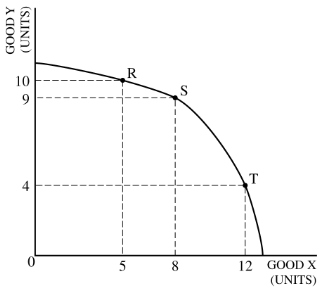
The diagram below shows the production possibilities curve for an economy that produces only two goods: X and Y.
The opportunity cost of moving production from point R to point T is
Responses
A
one unit of Good Y
B
five units of Good Y
C
six units of Good Y
D
three units of Good X
E
seven units of Good X
C
six units of Good Y

Use the graph to answer the question.
The graph above shows the production possibilities curve for a small township that is deciding to build parks and gymnasiums. Which of the following combinations of parks and gymnasiums is unattainable given the township's available resources?
Responses
A
5 parks and 6 gymnasiums
B
5 parks and 8 gymnasiums
C
10 parks and 6 gymnasiums
D
15 parks and 4 gymnasiums
E
20 parks and 4 gymnasiums
E
20 parks and 4 gymnasiums
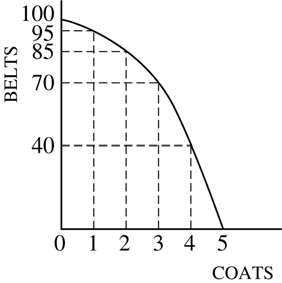
Refer to the following graph of a country's production possibilities curve.
If two coats are currently being produced, the opportunity cost of producing the third coat is
Responses
A
85 belts
B
75 belts
C
40 belts
D
15 belts
E
10 belts
D
15 belts
Which of the following best explains why many United States economists support free international trade?
Responses
A
Workers who lose their jobs can collect unemployment compensation.
B
It is more important to reduce world inflation than to reduce United States unemployment.
C
Workers are not affected; only businesses suffer.
D
The long-run gains to consumers and some producers exceed the losses to other producers.
E
Government can protect United States industries while encouraging free trade.
D
The long-run gains to consumers and some producers exceed the losses to other producers.
Assume that Country A exports one bushel of wheat in exchange for 2.5 bushels of corn from Country B. If the terms of trade are beneficial to both countries, which of the following must be true?
Responses
A
Country A has an absolute advantage in the production of wheat.
B
The cost of producing a bushel of wheat in Country A is less than 2.5 bushels of corn.
C
The cost of producing a bushel of wheat in Country A is greater than 2.5 bushels of corn.
D
Country A is producing inside its current production possibilities curve.
E
Country A needs to use more resources to produce wheat than to produce corn.
B
The cost of producing a bushel of wheat in Country A is less than 2.5 bushels of corn.
Home Nation Annual Production Possibilities | Foreign Nation Annual Production Possibilities | ||
|---|---|---|---|
Autos | Computers | Autos | Computers |
5 | 100 | 5 | 50 |
The table shows that Home Nation can produce five autos or one hundred computers using all its available resources in a year.
Foreign Nation can produce five autos or fifty computers using all its available resources in a year.
Based on the information provided above, which of the following must be true?
A
Home Nation has an absolute advantage in the production of computers.
B
Foreign Nation has an absolute advantage in the production of autos.
C
Home Nation has a comparative advantage in the production of autos.
D
Foreign Nation has a comparative advantage in the production of computers.
E
Neither nation has a comparative advantage.
A
Home Nation has an absolute advantage in the production of computers.
Correct. Home Nation can produce more computers than Foreign Nation when all resources are devoted to the production of computers; therefore, it has an absolute advantage in the production of computers.
If France has a comparative advantage in the production of grapes, and Italy has an absolute advantage in the production of olives, which of the following statements must be true?
Responses
A
France and Italy will not benefit from trading with each other.
B
France can produce more olives than Italy can.
C
France can produce more grapes than Italy can.
D
France has a lower opportunity cost in producing grapes than Italy does.
E
France has a higher opportunity cost in producing grapes than Italy does.
D
France has a lower opportunity cost in producing grapes than Italy does.
Correct. Since France has the comparative advantage in the production of grapes, France has a lower opportunity cost of producing grapes, compared to Italy.
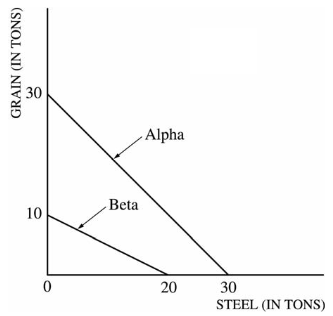
The diagram below shows the production alternatives of two countries, Alpha and Beta, producing two goods, grain and steel, using all of their available resources.
The theory of comparative advantage implies that Alpha would find it advantageous to
Responses
A
export grain and import steel
B
export steel and import grain
C
export both grain and steel and import nothing
D
import both grain and steel and export nothing
E
trade 1 ton of grain for 0.5 ton of steel
A
export grain and import steel
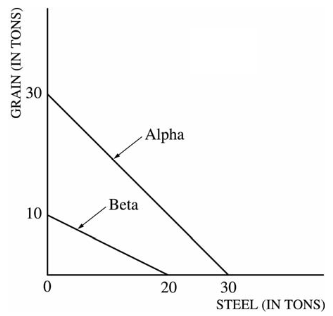
The diagram below shows the production alternatives of two countries, Alpha and Beta, producing two goods, grain and steel, using all of their available resources.
Before specialization and trade, the domestic opportunity cost of producing 1 ton of grain in Alpha and in Beta is which of the following?
Responses
A
Alpha | Beta |
1 ton of steel | 1 ton of steel |
B
Alpha | Beta |
1 ton of steel | 2 tons of steel |
C
Alpha | Beta |
2 tons of steel | 1 ton of steel |
D
Alpha | Beta |
1 ton of steel | 0.5 ton of steel |
E
Alpha | Beta |
0.33 ton of steel | 1.5 tons of steel |
B
Alpha | Beta |
1 ton of steel | 2 tons of steel |
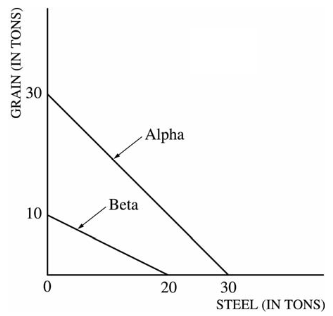
The diagram below shows the production alternatives of two countries, Alpha and Beta, producing two goods, grain and steel, using all of their available resources.
At what real exchange ratio, also referred to as the terms of trade, between grain (G) and steel (S) would both Alpha and Beta find it mutually advantageous to specialize and trade?
Responses
A
1G = 3.0S
B
1G = 1.5S
C
1G = 1.0S
D
1G = 0.5S
E
There is no real exchange ratio that would enable both countries to benefit, since Alpha has an absolute advantage in both goods.
B
1G = 1.5S

The data above indicates labor-hours needed to produce a single unit of each of two commodities in each of two countries. If labor is the only factor used to produce the commodities, which of the following statements must be correct?
Country A has an absolute advantage in the production of both commodities, but a comparative advantage in the production of wheat.
Country B has an absolute advantage in the production of both commodities, but a comparative advantage in the production of fish.
Mutually advantageous trade can occur between the two countries when 2.5 units of fish are exchanged for 1 unit of wheat.
Responses
A
I only
B
II only
C
III only
D
I and III only
E
II and III only
D
I and III only

The table above indicates the production alternatives of two countries, A and B, which produce computers and steel using equal amounts of resources. If both countries always produce at full employment, which of the following statements must be correct?
Responses
A
Mutually advantageous trade can occur between the two countries when 1 unit of steel from Country A is exchanged for 2 computers from Country B.
B
Mutually advantageous trade can occur between the two countries when 2 units of steel from Country B are exchanged for 1 computer from Country A.
C
Country A has an absolute and comparative advantage in the production of computers, and Country B has an absolute and comparative advantage in the production of steel.
D
Country B has an absolute advantage in the production of both commodities, but a comparative advantage in the production of steel.
E
Country A has an absolute advantage in the production of both commodities, but a comparative advantage in the production of steel.
B
Mutually advantageous trade can occur between the two countries when 2 units of steel from Country B are exchanged for 1 computer from Country A.

The table below indicates the number of labor hours required in Countries X and Y to produce one unit of food or one unit of clothing.
Given this information, which of the following statements is correct?
Responses
A
X has a comparative advantage in the production of both food and clothing.
B
Y has a comparative advantage in the production of both food and clothing.
C
X has a comparative advantage in food production, whereas Y has a comparative advantage in clothing production.
D
Y has a comparative advantage in food production, whereas X has a comparative advantage in clothing production.
E
Neither country has a comparative advantage in the production of either good.
C
X has a comparative advantage in food production, whereas Y has a comparative advantage in clothing production.